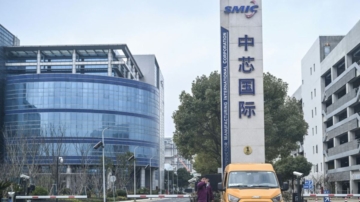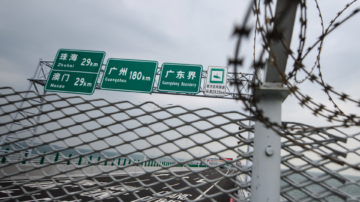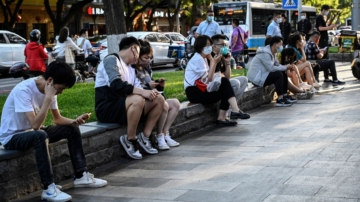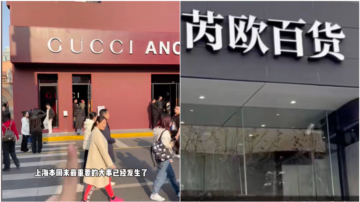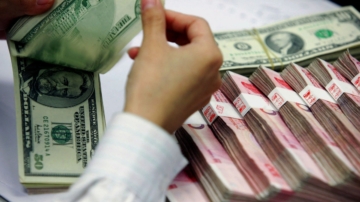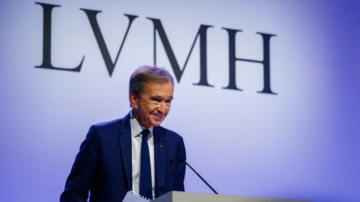【新唐人2014年08月16日讯】据中共央行日前发布的数据,7月份中国总社会融资仅为6月份的七分之一,创下了全球金融危机以来最低月读数。同时央行新增贷款只有6月份的三分之一。专家指出,中国经济全面出现萧条,有钱人已经外逃,国内百姓不知贷款有何用处,中共面临全面崩溃。
据央行网站8月13号消息,今年7月份社会融资规模为2731亿元,比上月减少了1.69万亿元,比上月大降86%。
而7月份国内银行新增贷款也在急剧下降。 7月全国新增贷款额为3852亿元,与6月的1.08万亿元相比,下降了三分之二。
中国独立经济评论家牛刀:“人家还去贷款吗,把房子卖掉了,换成美元走了,谁去贷款?它到了全面崩溃的时候,还在这里放水。贷款就是没人贷,大家都欠钱,都在过过日子,大家不知拿这个钱干甚么,日子过不下去了,人家贷款干甚么,多少人跳楼啊现在。”
近期中国中小企业和房地产开发商,跳楼跑路现象频频发生。
湖南省标榜的“带领农民奔小康的领军人物”肖仲望,因其省级科技型农业化公司,无法偿还超过亿万元的借款而自杀。湖南“恒盾集团有限公司”,“金鹰服饰集团”等员工过千的大公司,老板也因为资金炼断裂而跑路或跳楼。
而在江苏吴江、浙江嘉兴等纺织业聚集地,去年下半年来,已经有超过40名纺织企业老板跑路。
即使在以炒房闻名的温州,弃房现象也很严重。根据温州银监分局去年的数据,截止到去年7月末,温州各类“弃房跑路”案例就有595例。而到了今年一月,温州商品房均价,与2011年的最高点相比,降幅已经达到42%,导致不少炒房团成员跳楼自杀。
与此相反的是,今年5月,央行仍然鼓励商业银行向房企房贷。8月8号,福建出台房地产救市政策,要求银行增加房地产贷款。
而在今年4月,中共采取了为小企业减税,增加有针对性的基建开支,以及在农村地区和针对小企业的信贷优惠政策,等等所谓“微刺激措施”。
美国南卡罗来纳大学艾肯商学院教授谢田:“经济上的全面混乱,一方面中央政府又在搞甚么微刺激,另一方面,地方政府债务不断扩大,他们也感到破产的危机,就想靠卖地赚钱,但是房地产市场,人们也看到了这个市场泡沫的破灭,几种力量交织在一起,现在它是进也不是,退也不是。”
牛刀:“这很危险,这比日本泡沫破灭前的迹象还要鲜明。这全是你共产党动员大家去贷款的,最后出了事人家都找你政府,这个政府承担不了责任,这一次崩掉了,那就是整体的全部崩掉了,包括它的政治经济都要出问题。”
作为中国房地产最具影响力的独立评论家,牛刀在今年5月发文《中共高层已经在为处理房地产泡沫处理后事》,他在文中指出,海南房地产泡沫破灭后证明,只有民主政府才能做到承担房地产泡沫风险,但在中国,承担风险的一定是个人。
他指出,今年4月,国资委要求长期在楼市“挖矿淘金”的78家央企,加速退出房地产市场;5月份又颁发规范商业银行同业业务治理的“9号文”,收紧信用,并再次斩断房地产的资金炼。种种迹象表示,高层正在为房地产收尸,国际资本正在逃离中国。
另一方面,2009年以来,中国已成了全球最大的"印钞机",老百姓的财富不断遭到稀释。去年人民币发行量超过120万亿,是GDP的两倍,据人民银行资料,今年前面7个月,又印出超过80万亿钞票。
牛刀:“还在这里拼命的印钞,还在拼命的放贷,他就是放水也没有用,就表明天前面的那些刺激经济全部是失败的,可能也就是它中共历史上最后一次放水。”
另外,中国工业产出和固定资产投资增长,也在七月份出乎意外的放缓。
采访编辑/刘惠 后制/萧宇
Does The Unexpected July Credit Dive Mean The Start Of The Final Collapse?
According to recently released CCP Central Bank data,
China's total July social financing amount is only one seventh
of that in June – which is the lowest monthly level
since the global financial crisis.
At the same time, the central bank's new loans
are only one-third of June's.
Experts have pointed out that an economic depression has
fully occurred in China and the wealthy have fled overseas.
Citizens have no reason to apply for new loans,
and the CCP is facing a total collapse.
According to news released by the central bank's website
on Aug. 13, the scale of social financing in July
is 273.1 billion yuan, which was reduced by 1.69 trillion yuan
from last month's, and it is a 86 percent drop from last month.
In addition, new loans issued by domestic banks have also
declined sharply in July.
In July, the amount of entire nation's new loans was 385.2
billion yuan, compared to 1.08 trillion yuan in June.
This is a drop of two-thirds.
Chinese independent economic commentator, Niu Dao:
"No one will apply for loans, people all sell their houses,
exchange their money into US Dollars and leave.
Who would apply for loans?
The time of total collapse has been reached
and it still wants to make money.
No one will apply for loans, everyone already owes money
and just want to maintain their living.
People have no uses for loan money.
There is no point of asking for loans when they cannot
even live, so many people have jumped off buildings now."
Recently, many Chinese real estate developers and people
in small and medium enterprises have committed suicide
or absconded.
Xiao Zhongwang, who was known as 'the leader of peasants
to their wealth' in Hunan Province committed suicide when
his provincial agricultural science and technology company
was unable to repay loans of over one hundred million yuan.
The Hengdun Group Ltd. and Jinying Dress Group in Hunan
are all large companies with thousands of employees,
yet their owners jumped off buildings
or absconded because their funding chain broke.
In Wujiang City of Jiangsu, Jiaxing City of Zhejiang
and other textile industry commercial areas, more than
40 textile business owners absconded since the second half
of last year.
Even Wenzhou, which is known for its real estate speculators,
has a serious abandoned building issue.
According to last year's data from the Wenzhou Banking
Branch, by the end of July last year, there were 595 cases
of all kinds of 'abandoned buildings and absconding.'
In Jan. of this year, the average Wenzhou commercial
housing prices dropped 42 percent from their record high
in 2011, causing many real estate speculators to commit
suicide by jumping off buildings.
In contrast, in May this year the Central Bank still encouraged
commercial banks to loan to real estate enterprises.
On Aug. 8, Fujian launched a bailout policy for the real estate
market, which requires banks to increase real estate loans.
In April this year, the CCP adopted many so-called 'Micro-
stimulus measures' such as tax-reduction for small enterprises.
Targeted infrastructure spending increased, and preferential
policies for credit in rural areas and for small enterprises.
Professor at University of South Carolina Aiken, Frank Xie:
"It is full economic chaos.
On one hand, the central government has engaged
in the so-called micro-stimulus.
On the other hand, local governments' debts are still
expanding, they also feel the bankruptcy crisis and want
to earn income via real estate.
However, people also see the real estate bubble bursting,
and these forces combined has created a dilemma."
Niu Dao: "This is very dangerous, the signs are more apparent
than Japan's bubble burst.
You CCP encouraged everyone to take loans, and now things
turned bad, and everyone is coming to you.
The government is unable to take this responsibility.
This collapse will be an entire collapse in all aspects
including economically and politically.
As the most influential independent real estate commentator
, Niu Dao published an article, "CCP Top Level Is Arranging
Funeral For The Real Estate Bubble" in May this year.
The article addresses the bursting of Hainan's real estate
bubble, proving that only the democratic government
is capable of bearing the risk of the real estate bubble,
however in China, it is individuals who have to bear the risk.
He pointed out that in April of this year, the State-owned
Assets Supervision and Administration Commission had
asked 78 central enterprises that always 'dig gold'
in the real estate market to quickly quit the market.
The 'No. 9 Document' which regulates the commercial
banking business operation was issued in May in order
to tighten credit, and real estate's funding chain
was cut off again.
All signs indicate that the top level is breaking away from
real estate, and international capital is fleeing China.
On the other hand, since 2009, China became the biggest
money printing machine in the world.
People's wealth is constantly being diluted.
Last year, more than 120 trillion yuan was issued,
two times the GDP.
According to data from the People's Bank, in the first seven
months of this year, more than 80 trillion yuan was printed.
Niu Dao: "Continuing to desperately print money
and issue loans is ineffective, all the previous
economic stimuli have failed, and it will probably
be the last time for the CCP does so."
Moreover, China's industrial output and fixed asset
investment growth also unexpectedly slowed down in July.
Interview & Edit/LiuHui Post-Production/XiaoYu
据央行网站8月13号消息,今年7月份社会融资规模为2731亿元,比上月减少了1.69万亿元,比上月大降86%。
而7月份国内银行新增贷款也在急剧下降。 7月全国新增贷款额为3852亿元,与6月的1.08万亿元相比,下降了三分之二。
中国独立经济评论家牛刀:“人家还去贷款吗,把房子卖掉了,换成美元走了,谁去贷款?它到了全面崩溃的时候,还在这里放水。贷款就是没人贷,大家都欠钱,都在过过日子,大家不知拿这个钱干甚么,日子过不下去了,人家贷款干甚么,多少人跳楼啊现在。”
近期中国中小企业和房地产开发商,跳楼跑路现象频频发生。
湖南省标榜的“带领农民奔小康的领军人物”肖仲望,因其省级科技型农业化公司,无法偿还超过亿万元的借款而自杀。湖南“恒盾集团有限公司”,“金鹰服饰集团”等员工过千的大公司,老板也因为资金炼断裂而跑路或跳楼。
而在江苏吴江、浙江嘉兴等纺织业聚集地,去年下半年来,已经有超过40名纺织企业老板跑路。
即使在以炒房闻名的温州,弃房现象也很严重。根据温州银监分局去年的数据,截止到去年7月末,温州各类“弃房跑路”案例就有595例。而到了今年一月,温州商品房均价,与2011年的最高点相比,降幅已经达到42%,导致不少炒房团成员跳楼自杀。
与此相反的是,今年5月,央行仍然鼓励商业银行向房企房贷。8月8号,福建出台房地产救市政策,要求银行增加房地产贷款。
而在今年4月,中共采取了为小企业减税,增加有针对性的基建开支,以及在农村地区和针对小企业的信贷优惠政策,等等所谓“微刺激措施”。
美国南卡罗来纳大学艾肯商学院教授谢田:“经济上的全面混乱,一方面中央政府又在搞甚么微刺激,另一方面,地方政府债务不断扩大,他们也感到破产的危机,就想靠卖地赚钱,但是房地产市场,人们也看到了这个市场泡沫的破灭,几种力量交织在一起,现在它是进也不是,退也不是。”
牛刀:“这很危险,这比日本泡沫破灭前的迹象还要鲜明。这全是你共产党动员大家去贷款的,最后出了事人家都找你政府,这个政府承担不了责任,这一次崩掉了,那就是整体的全部崩掉了,包括它的政治经济都要出问题。”
作为中国房地产最具影响力的独立评论家,牛刀在今年5月发文《中共高层已经在为处理房地产泡沫处理后事》,他在文中指出,海南房地产泡沫破灭后证明,只有民主政府才能做到承担房地产泡沫风险,但在中国,承担风险的一定是个人。
他指出,今年4月,国资委要求长期在楼市“挖矿淘金”的78家央企,加速退出房地产市场;5月份又颁发规范商业银行同业业务治理的“9号文”,收紧信用,并再次斩断房地产的资金炼。种种迹象表示,高层正在为房地产收尸,国际资本正在逃离中国。
另一方面,2009年以来,中国已成了全球最大的"印钞机",老百姓的财富不断遭到稀释。去年人民币发行量超过120万亿,是GDP的两倍,据人民银行资料,今年前面7个月,又印出超过80万亿钞票。
牛刀:“还在这里拼命的印钞,还在拼命的放贷,他就是放水也没有用,就表明天前面的那些刺激经济全部是失败的,可能也就是它中共历史上最后一次放水。”
另外,中国工业产出和固定资产投资增长,也在七月份出乎意外的放缓。
采访编辑/刘惠 后制/萧宇
Does The Unexpected July Credit Dive Mean The Start Of The Final Collapse?
According to recently released CCP Central Bank data,
China's total July social financing amount is only one seventh
of that in June – which is the lowest monthly level
since the global financial crisis.
At the same time, the central bank's new loans
are only one-third of June's.
Experts have pointed out that an economic depression has
fully occurred in China and the wealthy have fled overseas.
Citizens have no reason to apply for new loans,
and the CCP is facing a total collapse.
According to news released by the central bank's website
on Aug. 13, the scale of social financing in July
is 273.1 billion yuan, which was reduced by 1.69 trillion yuan
from last month's, and it is a 86 percent drop from last month.
In addition, new loans issued by domestic banks have also
declined sharply in July.
In July, the amount of entire nation's new loans was 385.2
billion yuan, compared to 1.08 trillion yuan in June.
This is a drop of two-thirds.
Chinese independent economic commentator, Niu Dao:
"No one will apply for loans, people all sell their houses,
exchange their money into US Dollars and leave.
Who would apply for loans?
The time of total collapse has been reached
and it still wants to make money.
No one will apply for loans, everyone already owes money
and just want to maintain their living.
People have no uses for loan money.
There is no point of asking for loans when they cannot
even live, so many people have jumped off buildings now."
Recently, many Chinese real estate developers and people
in small and medium enterprises have committed suicide
or absconded.
Xiao Zhongwang, who was known as 'the leader of peasants
to their wealth' in Hunan Province committed suicide when
his provincial agricultural science and technology company
was unable to repay loans of over one hundred million yuan.
The Hengdun Group Ltd. and Jinying Dress Group in Hunan
are all large companies with thousands of employees,
yet their owners jumped off buildings
or absconded because their funding chain broke.
In Wujiang City of Jiangsu, Jiaxing City of Zhejiang
and other textile industry commercial areas, more than
40 textile business owners absconded since the second half
of last year.
Even Wenzhou, which is known for its real estate speculators,
has a serious abandoned building issue.
According to last year's data from the Wenzhou Banking
Branch, by the end of July last year, there were 595 cases
of all kinds of 'abandoned buildings and absconding.'
In Jan. of this year, the average Wenzhou commercial
housing prices dropped 42 percent from their record high
in 2011, causing many real estate speculators to commit
suicide by jumping off buildings.
In contrast, in May this year the Central Bank still encouraged
commercial banks to loan to real estate enterprises.
On Aug. 8, Fujian launched a bailout policy for the real estate
market, which requires banks to increase real estate loans.
In April this year, the CCP adopted many so-called 'Micro-
stimulus measures' such as tax-reduction for small enterprises.
Targeted infrastructure spending increased, and preferential
policies for credit in rural areas and for small enterprises.
Professor at University of South Carolina Aiken, Frank Xie:
"It is full economic chaos.
On one hand, the central government has engaged
in the so-called micro-stimulus.
On the other hand, local governments' debts are still
expanding, they also feel the bankruptcy crisis and want
to earn income via real estate.
However, people also see the real estate bubble bursting,
and these forces combined has created a dilemma."
Niu Dao: "This is very dangerous, the signs are more apparent
than Japan's bubble burst.
You CCP encouraged everyone to take loans, and now things
turned bad, and everyone is coming to you.
The government is unable to take this responsibility.
This collapse will be an entire collapse in all aspects
including economically and politically.
As the most influential independent real estate commentator
, Niu Dao published an article, "CCP Top Level Is Arranging
Funeral For The Real Estate Bubble" in May this year.
The article addresses the bursting of Hainan's real estate
bubble, proving that only the democratic government
is capable of bearing the risk of the real estate bubble,
however in China, it is individuals who have to bear the risk.
He pointed out that in April of this year, the State-owned
Assets Supervision and Administration Commission had
asked 78 central enterprises that always 'dig gold'
in the real estate market to quickly quit the market.
The 'No. 9 Document' which regulates the commercial
banking business operation was issued in May in order
to tighten credit, and real estate's funding chain
was cut off again.
All signs indicate that the top level is breaking away from
real estate, and international capital is fleeing China.
On the other hand, since 2009, China became the biggest
money printing machine in the world.
People's wealth is constantly being diluted.
Last year, more than 120 trillion yuan was issued,
two times the GDP.
According to data from the People's Bank, in the first seven
months of this year, more than 80 trillion yuan was printed.
Niu Dao: "Continuing to desperately print money
and issue loans is ineffective, all the previous
economic stimuli have failed, and it will probably
be the last time for the CCP does so."
Moreover, China's industrial output and fixed asset
investment growth also unexpectedly slowed down in July.
Interview & Edit/LiuHui Post-Production/XiaoYu

